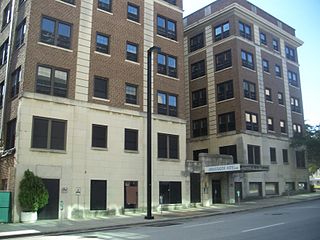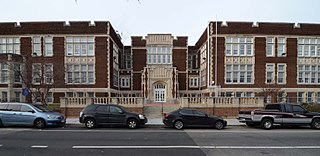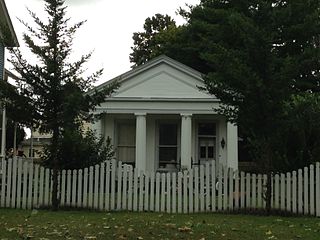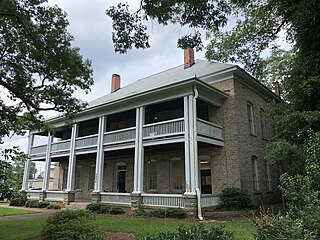
Fleischmanns is a village within the town of Middletown in Delaware County, New York, United States. The population was 351 at the 2010 census. It is named after Charles Louis Fleischmann, a Hungarian Jewish manufacturer.

Georgian Court University is a private Roman Catholic university in Lakewood Township, New Jersey. Founded in 1908 by the Sisters of Mercy, the university has more than 1,600 undergraduates and nearly 600 graduate students.

The Fairlie–Poplar Historic District is part of the central business district in downtown Atlanta. It is named for the two streets that cross at its center, northeast-only Fairlie and southeast-only Poplar. Fairlie–Poplar is immediately north of Five Points, the definitive center point and longtime commercial heart of Atlanta. It is roughly bounded on the southwest by Marietta Street, on the southeast by Peachtree Street or Park Place, on the northeast by Luckie Street or Williams Street, and on the northwest by Cone Street or Spring Street. It has smaller city blocks than the rest of the city, and the streets run at a 40° diagonal.

The 310 West Church Street Apartments, also known as the Ambassador Hotel, is a historic building located at 420 North Julia Street in Jacksonville, Florida, United States. On April 7, 1983, it was added to the U.S. National Register of Historic Places.

The Brick Schoolhouse is a historic colonial school building at 24 Meeting Street in the College Hill neighborhood of Providence, Rhode Island. The structure is noted as the home of one of the first free schools in the United States and the first brick schoolhouse in the city of Providence. In 1828, the schoolhouse became the first public school to be open to African American children. Since the 1960s, the Providence Preservation Society has leased the structure from the city for use as a meeting hall.

The Atlanta Biltmore Hotel and Biltmore Apartments is a historic building located in Atlanta, Georgia. The complex, originally consisting of a hotel and apartments, was developed by William Candler, son of Coca-Cola executive Asa Candler, with Holland Ball Judkins and John McEntee Bowman. The original hotel building was converted to an office building in 1999. The building is currently owned by the Georgia Institute of Technology and is adjacent to Technology Square.

Hyde School is a historic Romanesque Revival school at 130 High Street in Lee, Massachusetts. The school was built in 1894 from locally quarried marble. It is named for Alexander Hyde, who established the town's first school in his house on West Park Street, and was built on the site of the town's first public school.
Winnona Park is a historic area in the southeast corner of the Atlanta, Georgia suburb of Decatur. It is listed as a historic district on the National Register of Historic Places, but it is not one of the City of Decatur's locally designated historic districts.

Bruce-Monroe Elementary School at Park View is a bilingual elementary school in Washington, D.C. Named after Blanche Bruce and James Monroe, it has been located in the historic Park View School in the city's Park View neighborhood since 2008. It is part of the District of Columbia Public Schools.

The Sidney Lanier Cottage is a historic cottage on High Street in Macon, Georgia, that was the birthplace of poet, musician, and soldier Sidney Lanier. Sidney Lanier Cottage was purchased by the Middle Georgia Historical Society in 1973, and opened to the public in 1975. Until 2021, the Sidney Lanier Cottage served as a museum, event space, and home of the Lanier Center for Literary Arts. The Historic Macon Foundation sold the cottage and it has since been restored as a single family residence.

Spalding County Courthouse has been the name of successive courthouses of Spalding County, Georgia in Griffin, Georgia.

Tubman High School is a historic high school building in Augusta, Georgia. It was added to the National Register of Historic Places on March 7, 1994. It is located at 1740 Walton Way. It was named for Augusta philanthropist Emily Harvie Thomas Tubman and was founded as Neely's Institute in 1874. A new Tubman High School building was funded by a bond issue and constructed in 1917 according to designs by G. Lloyd Preacher. The three-story brick building's design is considered Beaux Arts architecture and includes terra cotta. It was the area's only public high school for girls until the 1950s.

The Millville School is a historic school building at 2 Fisk Road, just off Hopkinton Road in western Concord, New Hampshire. Built in 1923, it is a prominent local work of New Hampshire native Chase R. Whitcher, and is Concord's only school in the Georgian Revival style. It is also the only surviving element of the historic village of Millville that is not part of the nearby St. Paul's School campus. The building was listed on the National Register of Historic Places in 1985. It now houses Parker Academy, a private day school.

Smyth Public Library refers to several buildings that have served as the public library of Candia, New Hampshire, United States. The current building, which opened in 2002, is located at 55 High Street. The previous library building at 194 High Street was constructed in 1932 and was listed on the National Register of Historic Places in September 2007, and the New Hampshire State Register of Historic Places in April 2007.

Hog Hammock is an African-American community on Sapelo Island, a barrier island of the U.S. state of Georgia.

Ellamae Ellis League, was an American architect, the fourth woman registered architect in Georgia and "one of Georgia and the South's most prominent female architects." She practiced for over 50 years, 41 of them from her own firm. From a family of architects, she was the first woman elected a Fellow of the American Institute of Architects (FAIA) in Georgia and only the eighth woman nationwide. Several buildings she designed are listed on the National Register of Historic Places (NRHP). In 2016 she was posthumously named a Georgia Woman of Achievement.

The Paine Bank is a historic bank building located at 1008 Oak Street in Niles, Michigan. It was listed on the National Register of Historic Places in 1973.

The Seminary is a historic building at 6886 Main Street in Lithonia, Georgia. Originally constructed as a school in 1895, over the years it has also served as a hotel and a private home. It is currently used as a multi-tenant office building. It was entered into the National Register of Historic Places (NRHP) on November 15, 1978.

The Genesee Street School is a school building located at 835 W. Genesee Street in Lansing, Michigan. It was listed on the National Register of Historic Places in 2014.

Haralson Bleckley was an American architect who designed many buildings in his hometown of Atlanta, Georgia. Several of his works are listed on the National Register of Historic Places (NRHP). His office was in the Flatiron Building. He also proposed the Bleckley Plaza Plan, a largescale architectural project that would have seen the creation of a large plaza in downtown Atlanta.





















